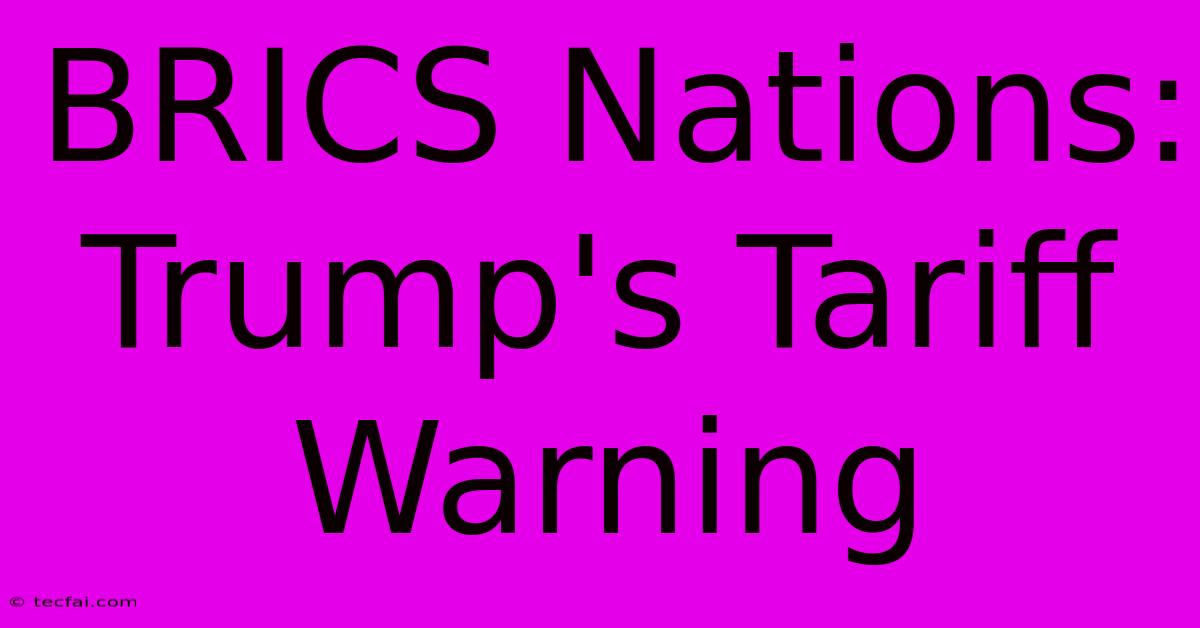BRICS Nations: Trump's Tariff Warning

Discover more detailed and exciting information on our website. Click the link below to start your adventure: Visit Best Website tecfai.com. Don't miss out!
Table of Contents
BRICS Nations: Trump's Tariff Warning and the Shifting Global Landscape
Donald Trump's presidency was marked by a significant shift in global trade relations, largely characterized by his administration's imposition of tariffs on various countries. This aggressive trade policy sent shockwaves throughout the international community, particularly impacting the BRICS nations – Brazil, Russia, India, China, and South Africa. While the direct impact varied across these diverse economies, Trump's tariff warnings forced a reassessment of global trade dynamics and spurred the BRICS nations to strengthen their own economic cooperation.
Understanding the Context: Trump's "America First" Trade Policy
Trump's "America First" agenda prioritized domestic industries, often at the expense of established international trade agreements. His administration levied tariffs on goods from numerous countries, citing unfair trade practices and the need to protect American jobs. This protectionist approach directly challenged the multilateral trading system championed by organizations like the World Trade Organization (WTO). The uncertainty generated by these unpredictable tariff actions significantly impacted global markets and investor confidence.
Targetting BRICS Nations: Varying Degrees of Impact
While Trump's tariffs targeted many nations, the impact on the BRICS varied considerably due to their differing economic structures and trade relationships with the United States.
-
China: China bore the brunt of Trump's trade war, facing tariffs on a vast array of goods. This led to retaliatory tariffs from China, escalating the trade tensions and creating significant uncertainty for businesses operating in both countries. The impact rippled through global supply chains.
-
India: India also experienced tariffs on certain goods, albeit on a smaller scale compared to China. The impact was felt in specific sectors, leading to adjustments in trade strategies.
-
Brazil: Brazil, a major exporter of agricultural products and raw materials, faced some targeted tariffs, though the impact was less severe compared to China and India.
-
Russia: Russia, with its relatively smaller trade volume with the US, experienced a less significant direct impact from Trump's tariffs.
-
South Africa: Similarly, South Africa's exposure to US tariffs was limited, meaning the direct economic consequences were less pronounced.
The BRICS Response: Strengthening Internal Cooperation
The uncertainty and disruption caused by Trump's tariff policies prompted the BRICS nations to intensify their own economic cooperation. This included:
-
Strengthening trade agreements within the BRICS group: The focus shifted towards increasing intra-BRICS trade to reduce reliance on the US market and mitigate the risks associated with external trade policies.
-
Diversification of trade partners: BRICS nations actively sought to diversify their trading relationships, reducing dependence on any single market.
-
Investment in infrastructure projects: Investments in infrastructure projects within the BRICS framework aimed to boost economic growth and reduce reliance on external investment.
-
Development of alternative payment systems: Moves were made to reduce reliance on the US dollar in international transactions, exploring alternative payment systems to lessen the impact of US sanctions and trade policies.
The Lasting Legacy: A Reshaped Global Order
Trump's tariff warnings, while directly impacting the BRICS nations to varying degrees, accelerated a pre-existing trend towards multipolarity in the global economic order. The experience spurred the BRICS to solidify their economic partnerships and pursue strategies to reduce reliance on the US market. This has resulted in a more complex and potentially less stable, but also more diversified, global trading system. The legacy of Trump's protectionist policies continues to shape the strategic decisions of nations worldwide, highlighting the enduring impact of his administration's trade approach.
The future of BRICS cooperation will significantly influence the trajectory of global trade and economic power. The challenges remain, but the response to Trump's tariff warnings has undeniably strengthened the internal bonds and strategic focus within the BRICS alliance.

Thank you for visiting our website wich cover about BRICS Nations: Trump's Tariff Warning. We hope the information provided has been useful to you. Feel free to contact us if you have any questions or need further assistance. See you next time and dont miss to bookmark.
Featured Posts
-
Ruth Langsford I M A Celeb
Dec 01, 2024
-
Rikishi In War Games Survivor Series
Dec 01, 2024
-
Rugby Ireland Defeats Australia Final Score
Dec 01, 2024
-
West Ham United 2 5 Arsenal Full Report
Dec 01, 2024
-
Early Retirement Go Nomad
Dec 01, 2024
